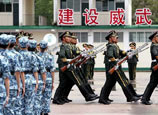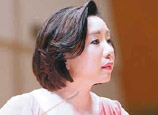
"Food can never be too good and cooking can never be done too carefully. Food cannot be eaten if the cutting is not even and properly done," according to "The Analects."
The names of the dishes are distinctive and tied to Confucius's philosophy and way of life. A dish known as "gingko poetry rites," originally called "honey gingko," was renamed by Yan Sheng, a 53rd-generation descendant of Confucius.
He renamed the dish after learning that the gingko nuts used to make it were picked from trees in front of the poetry hall in the Confucius Temple, choosing the name to commemorate the way Confucius taught his son Kong Li about poetry and virtue, Kong said.
"Each course in Confucius family cuisine has a special name with a profound meaning. The anecdotes and historical background behind the dish can turn any meal into a cultural experience," Kong added.
Peng Wenyu, a descendant of a Confucius Mansion chef and a 30-year veteran of Confucius-style cuisine, has written several works on the food's history and recipes.
"Cooking Confucius-style cuisine is complex, labor-intensive and demands great attention to detail," Peng said.H However, he said that the cuisine must adapt to modern times in order to remain relevant. Ingredients like shark fin and bear paw that are common in Confucius-style cuisine are banned for use in cooking food due to animal protection concerns.
"In ancient times, chefs at the Confucius Mansion handed down cooking skills and recipes only to their descendants or apprentices. But now I think we need to make it public so that it can be better preserved," Peng said.

















 Elder couples celebrate golden wedding anniversary in Hangzhou
Elder couples celebrate golden wedding anniversary in Hangzhou


![]()
